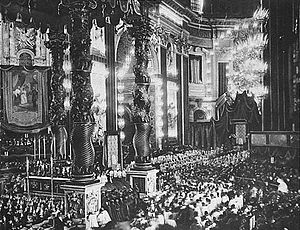Canonization of Joan of Arc
| Saint Joan of Arc | |
|---|---|

Canonization Mass of Joan of Arc in Saint Peter's Basilica.
|
|
| Virgin, Mystic, and Martyr | |
| Born | 6 January, c. 1412 Domrémy, Duchy of Bar, France. |
| Died | 30 May 1431 (aged approx. 19) Rouen, Normandy (then under English rule) |
| Venerated in |
Roman Catholic Church Anglican Communion |
| Beatified | 18 April 1909, St. Peter's Basilica by Pope Pius X |
| Canonized | 16 May 1920, St. Peter's Basilica by Pope Benedict XV |
| Feast | 30 May |
| Patronage | France; martyrs; captives; military personnel; people ridiculed for their piety; prisoners; soldiers, women who have served in the WAVES (Women Accepted for Volunteer Emergency Service); and Women's Army Corps |
Saint Joan of Arc (French: Jeanne d'Arc) (often known as "The Maid of Orléans") is a recognized saint of the Roman Catholic Church. Although she was excommunicated and burnt at the stake for heresy by pro-English clergy in 1431, central Church officials would later nullify her excommunication, declaring her a martyr unjustly executed for a secular vendetta. Her legend would grow from there, leading to her beatification in 1909 and her canonization in 1920
As with other saints who were excommunicated or investigated by ecclesiastic courts, such as Athanasius, Teresa of Ávila, and John of the Cross, Joan was put on trial by an Inquisitorial court. In her case, the court was influenced by the English, which occupied northern France, leading to her execution in the marketplace of Rouen. When the French retook Rouen in 1449, a series of investigations were launched. Her now-widowed mother Isabelle Romée and Joan's brothers Jéan and Pierre, who were with Joan at the Siege of Orleans, petitioned Pope Nicholas V to reopen her case. The formal appeal was conducted in 1455 by Jean Bréhal, Inquisitor-General of France, under the aegis of Pope Callixtus III. Isabelle addressed the opening session of the appellate trial at Notre Dame with an impassioned plea to clear her daughter's name. Joan was exonerated on July 7, 1456, with Bréhal's summary of case evidence describing her as a martyr who had been executed by a court which itself had violated Church law.In 1457, Callixtus excommunicated the now-deceased Bishop Pierre Cauchon for his persecution and condemnation of Joan.
...
Wikipedia
